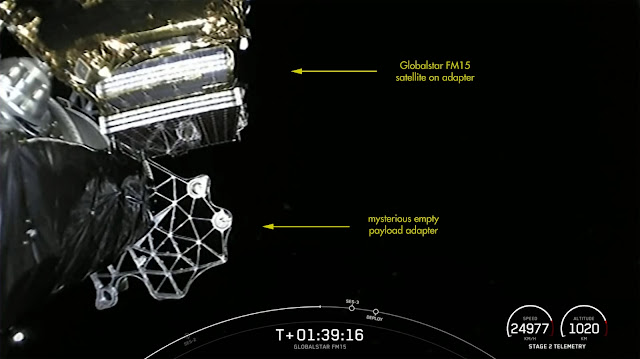The video footage above which I shot last night shows the classified objects covertly launched with the commercial Globalstar FM15 satellite on June 19 (see my previous post for backgrounds).
The objects are four payloads and a piece of Falcon 9 debris: USA 328 (2022-064B), USA 329 (2022-064C), USA 330 (2022-064D), and USA 331 (2022-064E), and they form a small 'train' with the piece of Falcon 9 debris (2022-064F) trailing the four at a slightly larger distance.
 |
| click image to enlarge (updated image) |
The image above [updated] shows the distances between the objects when they were over the Netherlands on June 22, 00:53 UT.
On June 20/21, 19 hours after launch, both Cees Bassa and me first picked them up, at more or less the same time, when we both did a planescan for the newly launched objects, using my estimated orbit here. They were a few minutes early on predictions, but pretty much on-track.
The payloads are faint, around magnitude +7 to +8: the Falcon 9 debris piece is much brighter, around magnitude +3.5 to +4.
Above is a frame-stack from video footage from that night. I used a Samyang 1.4/35 mm lens (I choose it because of its wide field of view), which with hindsight was not powerfull enough, so the four payloads were barely visible in the video: but the framestack nevertheless gives a good indication of the grouping of the objects (the Falcon 9 debris piece, F, was still reasonably close that night - it is slowly getting away from the payload group).
The next night, June 21/22, I used a more powerful lens, a Samyang 1.4/85 mm. This time all objects registered well, as can be seen in the video in top of this post.
Below are two frame-stacks from the second of two passes imaged with video that night, showing the 'train' of four payloads:
The second payload in the train ("USA 329") shows a slow but notable brightness variation, which can be noted in the video in top of this post, and also in the framestacks: note how it is fainter than the other objects in the first stack, and brighter in the second stack. This could indicate that it is tumbling. The other objects appear steady so far.
As can be seen in the framestacks, the payload 'train' seems divided into two subgroups (or pairs).
The payloads are in 520 x 531 km, 53.0 degree inlined orbits. The piece of Falcon 9 debris is in a 513 x 538 km orbit (these values might still change somewhat when future observations are added: they are based on a one-day arc).
The orbit is clearly lower than the ~1111 x 1125 km orbit of Globalstar FM15, and the orbital inclination differs by one degree from the latter orbit.
 |
| click image to enlarge |
Provisional orbital elements for all five objects, based on observations by Cees Bassa and me from three imaged passes on two consecitive nights (June 20/21 and 21/22):
USA 328 520 x 531 km
1 52889U 22064B 22173.02277179 0.00000885 00000-0 48598-4 0 08
2 52889 53.0076 219.0756 0008275 266.6022 93.4023 15.13589607 07
rms 0.013 deg 22 obs Jun 20.98 - Jun 22.04 UT
USA 329 519 x 531 km
1 52890U 22064C 22173.02278172 0.00000889 00000-0 48818-4 0 03
2 52890 53.0020 219.0447 0008904 282.2135 77.7858 15.13589477 09
rms 0.018 deg 18 obs Jun 20.98 - Jun 22.04 UT
USA 330 519 x 531 km
1 52891U 22064D 22173.02280361 0.00000956 00000-0 52537-4 0 05
2 52891 52.9994 219.0247 0008947 287.7569 72.2446 15.13572484 07
rms 0.012 deg 22 obs Jun 20.98 - Jun 22.04 UT
USA 331 520 x 531 km
1 52892U 22064E 22173.02281812 0.00000893 00000-0 49073-4 0 09
2 52892 53.0012 219.0348 0008303 279.7321 80.2731 15.13564015 03
rms 0.010 deg 22 obs Jun 20.98 - Jun 22.04 UT
FALCON 9 DEB 513 x 538 km
1 52893U 22064F 22173.02296837 0.00000882 00000-0 48416-4 0 01
2 52893 52.9956 219.0143 0018707 315.9409 44.0091 15.13486695 05
rms 0.016 deg 27 obs Jun 20.98 - Jun 22.04 UT





